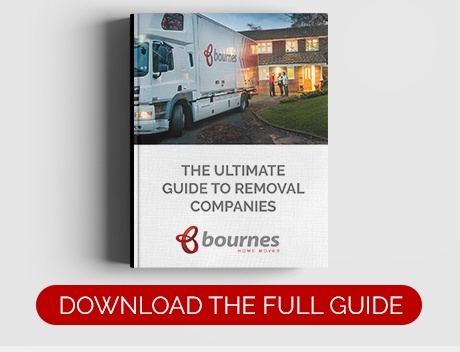There’s a lot to remember when it comes to moving moving into your new home – from all the big physical stuff right down to the small bits of paperwork – so it’s no wonder that there are some things that get left behind.
When we teamed up with Rightmove to run a competition based on your removal horror stories, we were reminded just how many things people forget when they move.
1. Label boxes
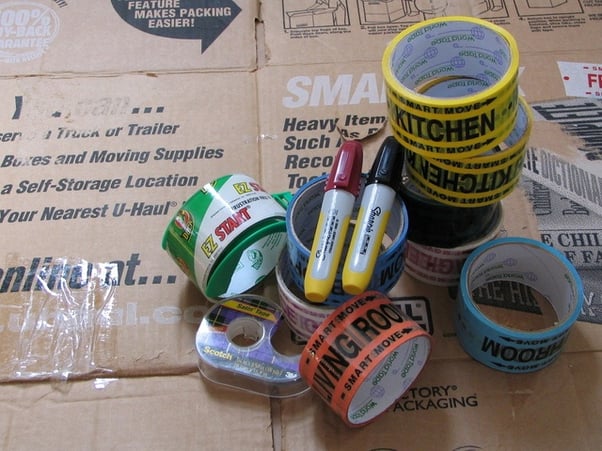 Image sourced from www.freeimages.com/RachelSpauldilng
Image sourced from www.freeimages.com/RachelSpauldilng
This might sound like an obvious one but when you're rushing, little things like labelling a box can easily be forgotten. And although it seems like a small mistake to make, the impact it can have on your move at the other end can be quite a big one, as one response to our competition proved:
“This is silly but I never label my boxes! So the first day always involves me scattering all my belongings everywhere and still never finding what I'm looking for!”
Our tip: Labelling boxes properly is one of the top things people forget when moving house - yet one of the most important! Always label your boxes in marker pen with the name of the room they are to be put in when unloading and what's in it (as detailed as you like).
Mark any box containing fragile items clearly as this will ensure the crew take extra care when loading and unloading it from the truck, and mark anything that has priority items with 'unpack first'. This blog post on labelling boxes when moving house explains everything you need to know about getting this right.
2. Use the correct packing materials...
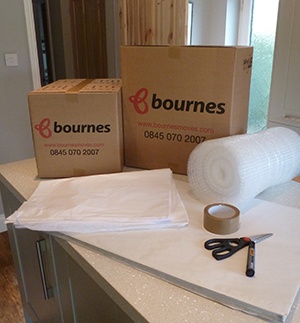
Not using the right packing materials can lead to several issues, the biggest one being the risk of damage. Boxes that aren't strong enough for their contents can easily collapse under their weight, or bin bags of clothes can tear open leaving your items at best scattered all over the floor and at worst broken or damaged.
Boxes or bags that don't seal properly can also leave your items vulnerable to the elements if you're moving in bad weather. Another common issue is using boxes that previously contained food stuff that leave a nasty odour on your belongings if they have picked one up from their original contents!
The teller of one extreme moving horror story told us how his choice of packing material ended up being his downfall:
“Being a pretty lazy guy, I didn't bother packing up my things from my uni house until the day I was leaving, in a pretty hungover state I decided to chuck everything in bin bags, I took them to my mum's house where I was staying for the summer, and yes you guessed it, she threw them all out with the rubbish while I was catching up with my mates in the pub!”
and having enough boxes to do the job.
Underestimating the amount of stuff you’re trying to move and how many trips it will take you to get there is a common problem encountered by those that try and move themselves. It’s always hard to calculate the volume of your goods by yourself, and this can mean you quickly run out of packing materials as one of our RightMove competition entrants found:
“3 years ago, we moved to a house that was a few streets away. I thought I was organised and had a few things to pack the night before. It turned out that I ran out of the boxes and had to get my partner to run round to the new house, dump the contents and run back to let me re-use the boxes.”
Our tip:Using a removal company means an experienced surveyor will calculate the number of boxes you’ll require and they will provide the standard of packing materials needed to safely transport your items.
However, if you’re still intent on moving yourself make sure to buy the appropriate quantity (best to overestimate!) and appropriate quality packing materials (i.e. don’t use fruit boxes from the local supermarket!) you can buy your boxes and packing paper from a removals firm – not only will they be sturdy enough to withstand the move, but some even offer second hand boxes which will lower the cost – and avoid using bin liners!
Read our guide to the 9 packing materials needed for a house move to make sure you've got everything covered.
3. Seriously consider using a removal company

Most of us have moved ourselves at some point in our lives, but its easy to forget how time consuming, physically exhausting and emotionally stressful it can be, especially as our family, property size and years of accumulated belongings grow.
Using a removal company may cost less than you think and could save you time, reduce the risk of damage, take away some of the stress and make coping with inevitable late changes or move day challenges much easier.
Still not sure whether to use a removal company?
If you've not considered using a professional removal company yet or are still on the fence check out our guide Using a professional removal company vs. doing it yourself or if you're moving to/from the South East of England find out how much a removal company might cost for your move.
Already decided to use a removal company?
Great choice, check out our guide below to find out how to choose the right removal company for you.
4. Not to pack things you'll need and accidentally packing things you shouldn't have

Image sourced from www.freeimages.com / Giane Portal
Once you eventually get into the swing of packing, it can be hard to stop - and while that’s good, it’s also bad if you end up getting carried away and packing things you might need on the day of the move. This problem compounds if you' have 'helpers' packing with you who don't know what you want to take with you.
A couple of the answers given in our Rightmove competition highlight just how easily it can be done; at best, when moving a short distance, this is a disruption you can do without at the end of a long day:
“I packed all my clothes and everything and had to wear the same thing for days.”
But at worst, it can have major implications on your move – especially if it’s an international one:
“When moving internationally we had professional packers in to pack and ship our house contents. We allocated one room which had items that were not to be packed and everyone was informed. The day went well and by the end, everything was packed and my husband and I set about putting the items from the allocated ‘no pack’ room into the car to head out.
After packing, we discovered that the backpack with our plane tickets was not there – we'd forgotten to put it in that room! Thankfully the tickets were reprintable, we were just grateful we hadn’t put our passports and credit cards in as well as we didn’t see our stuff for another 12 weeks!”
Our tip: Always work out what you will be needing to keep on your person well in advance of your move day. This could be simple things like a change of clothes, toilet rolls, a wash bag and towels, phone chargers and some food, or more important things like passports, jewellery, laptops and travel documentation.
Make a list of the things you’ll need immediate access to at your new house and when it comes to packing this stuff, put it in a completely separate bag or box and keep it in the car or a clearly identified separate area.
Double check it before you start packing the rest of your items so that anything left out can be added before the removal crew load anything onto the truck – particularly if you’re moving abroad and won’t have access to your things for several weeks.
5. Make an essentials box
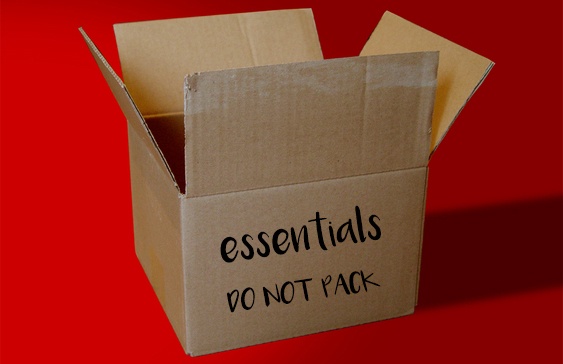
Similar to number 3, this is something that a lot of people often overlook, believing that once they reach their new house it will be easy to access everything they need at once.
Depending on the time of day you move, you might not have the time to start unpacking properly when you get to your new house, and the last thing you need is to be rooting through all of your boxes in search of your essentials before bed.
Don’t believe us? These are just a couple of the answers we received in our recent Rightmove competition from people whose moving day was made all the more stressful by not having access to their essentials:
“Our last move was a bit of a rushed affair and we had to do a lot of things last minute. My other half did a run to the charity shop to hand in a load of stuff to save us from moving things we didn’t need while I started loading up. A lot of trips back and forth later and we finally got everything in.
After sighing and sitting down for five minutes, I said: ‘let’s get the kettle on’. I unpacked the kettle and went in search of the mugs. I opened the box I thought they were in, only to find a load of my son’s old plastic toys – every mug, cup and glass had gone to the charity shop and we were left with the stuff we were trying to get rid of!
We ended up opening the champagne we were saving for a special occasion and taking turns to drink from the bottle. We probably needed that more than the tea anyway!”
Our tip: The essentials box didn’t earn its name for nothing – it really is an important part of your move. Of all the things people forget when moving house, this is probably the most annoying and will cause you inconvenience on the day.
The best way to start deciding what should be in yours is to:
- Think about all of the items you use daily: Prioritise items you'll need straight away at your new house, items that'll speed up your unpacking process or those that you can grab in case of an emergency.
- Consider the time of year you’re moving: Tailor your essentials box to include items that match the season. In the summer pack garden toys for the children to play with or an icebox with cold drinks instead of tea and coffee and in the middle of winter think of mugs for hot chocolate and soup, a de-icer for the car and some grit for any paths and driveways that might need it.
Make a list of what you need or download our essentials box packing list and start packing your essentials box in time, preferably just before everything else. This gives you the chance to check your list and add things that might forget.
Label it clearly with 'do not pack' then first thing on moving day put it in the car so that it’s out of the way and completely separate from the rest of your boxes to avoid any mix-ups when loading the truck. If you don't want to take it in the car with you ask your removals crew to load it last so it can be the first box off at the new house.
6. Plan to avoid moving on a Friday
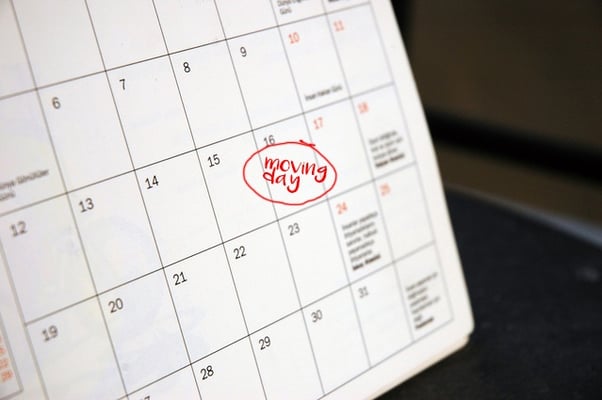
Unless you really can’t avoid it, try as hard as you can not to move on a Friday.
It might be tempting to move on a Friday so you have the weekend to sort your house out. Fridays are, however, notoriously busy days for removal companies so you might end up paying a higher price or struggling to find an available mover. The other risk of moving on a Friday is if anything goes wrong, many solicitors or estate agents are closed over the weekend meaning sometimes problems can't be resolved until the following week, this can mean unplanned costs.
Here’s one account of a bad 'Friday move' experience as recounted by one of the entrants of our recent Rightmove competition... we think maybe not everyone is this lucky!
“Years ago when my children were very small I moved into my house on my own. It was a Friday evening and was very hard work. The house at the time was bare – no carpets or anything – but I knew I could work hard to get it right soon, so tried to keep upbeat.
I looked around and saw the kids were dusty so thought, ‘right, bath and bed’. I turned the water on and to my horror realised there wasn’t any hot water. I thought right, well this must be an emergency, so I phoned the number and they told me it was not an emergency, and no one could come until Monday!
I put the phone down and just didn’t know what to do then I broke down and cried. Half an hour later, miracle of miracles, a rather handsome plumber came like an angel with a spanner and fixed the hot water. He told me the lady who had taken my call had felt so bad that she bent the rules a little and sent him round. I’ve never been so grateful!"
Our tip: If you have to move on a Friday, don't panic, plan your move early to avoid issues with availability and to get the best prices, but if you can avoid it then it's worth trying to. If you are moving on a Friday make sure you've got back up plans in case things go wrong, especially if you're aware of any potential risks like the poor person above!
7. Collect ALL the right keys from the previous owners
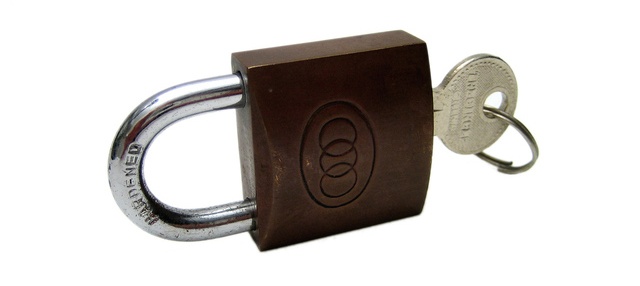
Image sourced from www.freeimages.com/jean scheijen
You’ve got the front and back door keys and you’ve even remembered to ask for the ones for the windows and conservatories – but is that all you need to be worried about? You might think so, but after reading one of the entries to our moving horror stories competition that we ran with Rightmove recently, we’re not sure!
“I was so excited when I got the keys to my first house. I came in the back door and the delivery driver, with my furniture, came to the front door – but I couldn’t get the door open as I didn’t have a key for the deadbolt, so I asked him to come to the back door then realised that the back door would no longer open.
I had to pass him the keys through the window in the kitchen as I realised the dining room window was painted shut. We moved the boxes in but the couch and table wouldn’t fit through the back door and I had to wait until the next day for the previous owners of the house to return the deadbolt keys to move the rest of the furniture in.”
Our tip: Make sure you check in advance with the owners of the house that you’re buying whether they have all the keys you’ll need on moving day.
Don’t forget about things like sheds, conservatories, garages and garden gates or you might find yourself in the same awkward situation as above. Once you’re in, it's a good idea to get ALL of your locks changed. The previous owners might no longer have keys but you can never be sure who else has been given a copy over the years, and many insurance policies will be invalid unless the locks have been changed.
8. Check that everywhere has been properly cleared when you leave

Image sourced from www.freeimages.com/stef~
It might sound obvious, but making sure you’ve packed everything before you move is always a good idea. When you’re concentrating on the important items you use regularly, it’s easy to overlook the cupboard under the stairs, the attic and even the contents of the garden shed – particularly if you’re moving in a hurry. By being extra vigilant, you’ll ensure you don’t fall into the same trap as some of the entrants of our Rightmove competition:
“We loaded all our belongings into the truck before the truck set off and. We handed the keys to the Estate Agents and set off to our new home only to discover the next day we had left our 42” Samsung LCD TV in the cupboard under the stairs (put there by me to keep it safe while moving boxes!).”
Our tip: Do a proper walkthrough of your house with the removals crew foreman once you think everything’s out, open all the cupboards and drawers and don’t forget the loft and any outside spaces – don’t just quickly glance in the rooms! Don't forget to check things that were hanging on walls too, clocks are one of the most common items that get left behind!
9. Inform people about your move
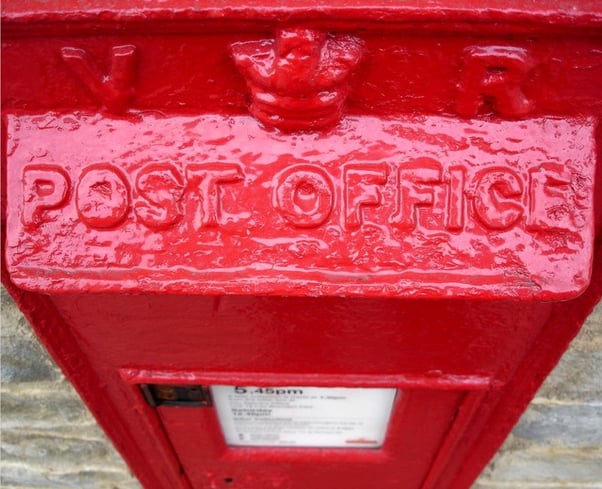
Image sourced fromwww.freeimages.com / Rod Kay
You’ve done the hard bit and got from A to B – but just how many people that need to know you've moved house actually do? You’d be surprised at the number of people who move that simply forget to tell anyone about it, including their family members…
“The day we moved into our first house we were sitting eating dinner on cardboard boxes when we heard the front door open followed by the words “coo wee!” As the lady walked in we all looked at one another in complete confusion…it turned out she was the cousin of the previous owner who hadn’t realised she’d already moved out – she was so embarrassed! We locked the door from then on understandably!”
“I forgot to tell my mum the day we were moving and a few days later she went to the old house and sat in the front room. She wasn’t amused when the new owner asked who she was – she thought she had dementia for a few minutes! We didn’t know she was visiting and had been planning to pick her up and take her to the new house!”
Taken from our recent Rightmove competition, these are just two examples of the kind of situations that can arise when people fail to inform all the right people about their move.
Our tip: As soon as you get your move date confirmed, start letting people know. Remember to go through all insurance providers, utilities companies, the bank, doctors, your place of work and anywhere else that you correspond with regularly and inform them of your new address. For a full list check out our 'who to inform when moving house checklist'.
It's a good idea to go to the Post Office and fill in a form to get all post redirected from the date of your move (there may be a charge for this service). A couple of weeks before you move, fill in some change of address cards for friends and family with the date of your move on it to make it easier to let everyone know in one go…or they might end up paying your new owners a surprise visit!
Bonus tip: Don't leave it too late to start getting organised.
Our average customer moving within the UK starts planning for their move 4-6 weeks before move day. This gives enough time to get removals quotes, choose which removal company is right for you, get your move booked and to start packing, meaning you don't have to rush and are at less risk of making the mistakes above.
Ready to get started?

.png)


